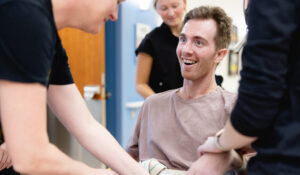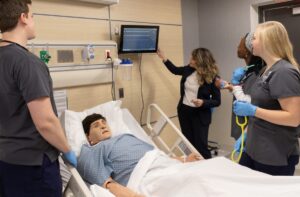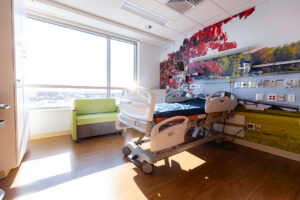How Are You Sleeping?
A simple question that opens the door to better rest, better breathing, and a foundation for healing. Understanding sleep apnea helps explain why sleep matters so much to your overall health.
Mary’s Story:
Turning Loss into AwarenessMary knows firsthand how vital sleep health can be. Her husband passed away before he could get help for his sleep apnea, a loss that inspired her mission to ensure no one else suffers silently. Through Mary’s compassion, our Sleep Program was built to provide education, support, and early intervention so families can rest easier knowing help is here.
This shared commitment has allowed us to expanded education, improved access to testing and treatment, and created resources that support not only our patients, but the whole community.
Start Your Journey to Better Sleep
Better sleep begins with understanding your sleep health. Through Mary’s continued commitment to the community, she has partnered with Cleveland Clinic to offer access to a free sleep app that includes a simple questionnaire to help assess your risk for common sleep disorders. At the end of the assessment, you’ll receive personalized information and local resources to help you take the next steps toward treatment. Download the Sleep by Cleveland Clinic app on the Apple App Store or Google Play.
Breathing Easy: Understanding Sleep Apnea and Finding Hope
Understanding Sleep Apnea
Sleep apnea is a common disorder in which breathing repeatedly stops and starts during sleep. These interruptions strain vital organs – especially the heart and brain, and can increase the risk of serious health problems if left untreated. Nearly 1 in 3 Americans has some form of sleep-disordered breathing, and many don’t even realize they have it.
- Frequent Headaches, especially in the morning
- Trouble with memory, focus and attention
- Irritability or mood changes
- Feeling tired, distracted or unrested despite a full night of sleep
- Daytime Drowsiness or falling asleep unintentionally
- Loud, chronic snoring
- Gasping or choking during sleep
- Restless sleep or waking up frequently during the night
- Ongoing daytime exhaustion, poor focus, and brain fog
- Increased risk od workplace and driving accidents
- Rising strain on the body that can lead to high blood pressure
- Higher risk of heart disease, stroke, and diabetes
- In severe cases, life-threatening complications
Different Types
Obstructive Sleep Apnea (OSA): The most common form, caused by the airway becoming blocked or collapsing during sleep.
Central Sleep Apnea (CSA): Caused by the brain not sending proper signals to the muscles that control breathing.
Some patients have a combination, called complex sleep apnea.
Causes
Risk factors include excess weight, neck circumference, family history, smoking, nasal congestion, and certain medical conditions. However, anyone can develop sleep apnea — even people who are thin and healthy.
Testing & Treatment
- In-hospital or at-home sleep testing
- Personalized equipment setup (CPAP/BiPAP)
- Ongoing support to optimize comfort and results
Follow-Up Care
- 90-day check-in with your sleep provider: We review your progress, answer questions, and adjust your therapy as needed.
- Annual follow-up with your sleep provider: Stay on track with yearly assessments and timely reordering of new supplies for best results.

Sleep Care that fits your Recovery Journey
We offer something unique:
Inpatient Sleep Care Process
What can take months in an outpatient setting is often completed during your inpatient rehabilitation stay. While you focus on recovery, our team manages the entire sleep care process, from evaluation and testing to equipment setup and education. We also assess whether inpatient diagnosis and treatment are the right fit at this time, and if not, we guide you with clear next steps to continue care safely as an outpatient.
Team Approach
Our multidisciplinary team, including respiratory therapists, physicians, and nurses, works together to help you achieve better sleep and better health.
Personalized Mask Fitting
Our specialists ensure your mask fits comfortably and effectively because one size never fits all. Our team can monitor progress night after night, or over time, allowing for more individualized adjustments to settings, mask fit and patient comfort concerns.
Dedicated Education & Support
Before you go home, you’ll receive hands-on instruction, personalized tips, and ongoing support to help you feel confident using your equipment.
Bob's Sleep Story
Frequently Asked Questions
How does a CPAP machine work?
A CPAP machine gently blows air through a mask into your airway to keep it open while you sleep. This prevents pauses in breathing and helps you get more restful, restorative sleep.
How do I know if my mask fits correctly?
Your mask should feel snug but comfortable, without air leaks or pressure points. If you notice irritation, leaks, or discomfort, contact your provider — small adjustments or trying a different style (nasal, nasal pillows, or full-face mask) can make a big difference.
What if I can't get used to my CPAP mask?
This is common at first. Try wearing the mask for short periods while awake to get used to it. Make sure your straps aren’t too tight, and that your humidifier settings are comfortable. Your respiratory therapist can also help you find a better fit or troubleshoot any issues from your durable medical equipment (DME) company.
How often should I clean my equipment?
Daily cleaning of your mask cushion with mild soap and warm water is recommended. Your headgear and tubing can be washed weekly, and filters should be replaced as instructed by your equipment provider. Let everything air dry completely.
How often should I replace my CPAP supplies?
Regular replacement keeps your equipment working properly and hygienically. Mask cushion: every 1–3 months
Headgear: every 6 months
Tubing: every 6 months
Filter: monthly or as needed
Water chamber: every 6 months
It’s also important to follow up at least once a year with your sleep center. This ensures your supplies continue to be covered by insurance and your physician can renew your prescription as needed. Regular check-ins also give you a chance to review your settings, comfort, and overall progress with therapy.
What if I wake up with a dry mouth or stuffy nose?
You may need to adjust your humidity or temperature settings. If you use a nasal mask and breathe through your mouth, adding a chin strap or switching to a full-face mask may help.
Can I travel with my CPAP machine?
Yes! CPAP machines are portable and allowed on airplanes. Always bring it as a carry-on item and carry your prescription in case airport security asks.
Do I have to use CPAP every night?
For best results, yes. Sleep apnea returns whenever the CPAP isn’t used. Regular nightly use improves energy levels, mood, and heart health.
How do I order new supplies?
Most suppliers send reminders when it’s time to replace parts. You can also contact our respiratory team at your durable medical equipment (DME) company directly for assistance with ordering or billing questions. Their number should be listed on your unit.
Who can I call if I have problems with my CPAP?
Don’t hesitate to reach out if something doesn’t feel right — small adjustments can make a big difference in your comfort and success. Call your durable medical equipment (DME) company or sleep center as they can review your CPAP device data and sleep logs, perform a thorough equipment audit, and determine is any adjustments need to be made. They can also help with mask fit, pressure issues, or comfort concerns to make sure you’re getting the most benefit from your therapy.


